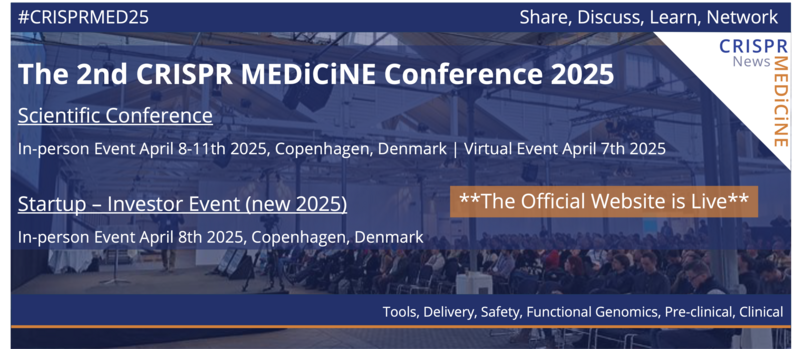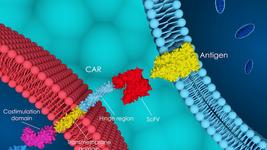CMN Weekly (28 October 2022) - Your Weekly CRISPR Medicine News
By: Gorm Palmgren - Oct. 28, 2022
Top picks
- Results from a phase 1 clinical trial of CRISPR-engineered CAR19 universal T cells for treating children with refractory B cell leukaemia are reported in Science Translational Medicine. Four of six patients infused with the so-called TT52CAR19 T cells exhibited cell expansion, achieved flow cytometric remission and received allogeneic stem cell transplantation. Two patients required biological intervention for grade II cytokine release syndrome, one developed transient grade IV neurotoxicity, and one developed skin GVHD, which resolved after transplant conditioning. You can read more about the clinical trial at CRISPR Medicine News.
- American researchers have developed a new CRISPR tool called ‘Craspase’, in which a guide RNA is used to direct proteases to degrade the protein product of a gene rather than directing nucleases to edit the gene itself directly. Because Craspases do not touch DNA, they could be a safe alternative to Cas nucleases and potentially be used in future therapeutic applications.
Research
- A new in vivo cleavable donor plasmid allow for targeted transgene integration by CRISPR-Cas9 and CRISPR-Cas12a. The plasmid, named pCriMGET_9-12a, comprises the protospacer-adjacent motif sequences of Cas9 and Cas12a at the side of an off-target free synthetic CRISPR-coded RNA target sequence and a multiple cloning site for donor cassette insertion. As a result, more than 25% targeted knock-in of long external DNA (> 4 kb) in mice was obtained by both CRISPR-Cas9 and CRISPR-Cas12a.
- Danish scientists have developed a web server for gRNA design with a user-friendly graphical interface, which provides interoperability between our on- and off-target prediction tools, CRISPRon and CRISPRoff, for a complete and streamlined gRNA selection. Furthermore, the CRISPRon and CRISPRoff webservers and command-line tools are freely available.
- BoostMEC is a new approach that uses boosting models to provide state-of-the-art predictions of CRISPR-Cas9 cleavage efficiency for sgRNA design and selection. BoostMEC relies on direct and derived sequence features of sgRNA sequences and is based on conventional machine learning, allowing it to produce more interpretable feature insights and predictions.
- American researchers have comprehensively analysed and accurately quantified unintended large gene modifications induced by CRISPR-Cas9 gene editing. They find that large deletions of up to several thousand bases occur with high frequencies at the Cas9 on-target cut sites on the HBB (11.7 to 35.4%), HBG (14.3%), and BCL11A (13.2%) genes in HSPCs and the PD-1(15.2%) gene in T cells.
- A novel method called CRISPR-KRISPR (CRISPR-Knock-ins and Random Inserts Searching PRotocol) aims to identify off-target lesions and random insertions of donor DNAs and their characterisation in knock-in mice. The method uses as little as 3.4 μg of genomic DNA and can easily be incorporated as an additional step to genotype founder animals for further breeding.
- Researchers in China have developed a new small molecule-based method that employs G-quadruplex (G4) to modulate gene editing and expression in human cells. First, G4-guided RNA engineering is performed to generate guide RNA with G4-forming units (G4-gRNA) that can be chemically targeted.
- A new machine learning framework, dubbed PreAcrs, can identify anti-CRISPR proteins. The method demonstrates powerful predictive capability and provides a new perspective for anti-CRISPR protein identification that is superior to currently known, traditional screening methods that are time-consuming and inefficient.
Industry
- CRISPR Therapeutics has announced that its Chief Operating Officer, Lawrence Klein, PhD, will be stepping down from the Company to pursue external opportunities. However, he is expected to remain with the Company through year-end to help ensure a smooth transition. A search is underway to find a successor to Dr Klein.
Detection
- Chinese scientists have described a fully automated CRISPR-LAMP platform for detecting SARS-CoV-2 delta and omicron variants. The method can precisely manipulate the CRISPR-LAMP droplet and perform combined reactions that can discriminate the variants with 100% specificity and over 70% sensitivity.
- Korean scientists have developed a hybrid CRISPR-Cas protein for one-pot detection of DNA and RNA. The new protein combines Cas12 and Cas13, and the new method successfully detected both WT SARS-CoV-2 and the N501Y mutant variant with a detection limit of 10 viral copies per reaction without cross-reactivity.
- French researchers have developed a CRISPR-based tool kit for diagnosing Human African Trypanosomiasis called SHERLOCK4HAT. The new method is an adoptation of SHERLOCK, and it can detect trypanosomes with up to 100% sensitivity and 94.1% specificity.
Reviews
- "Advances in CRISPR therapeutics" is a review by American researchers. It takes a historical perspective on the application of CRISPR technology to edit the non-coding genome, modulate gene regulation, make precise genetic changes and target infectious diseases that have the potential to lead to curative therapies for many previously untreatable diseases.
News from CRISPR Medicine News
- We brought a special update with news from the gene-editing clinical trials on Wednesday. The last few months have seen many updates for gene-editing therapies in development for cancer, HIV, infectious disease and several inherited diseases, and they are all here.
To get more of the CRISPR Medicine News delivered to your inbox, sign up to the free weekly CMN Newsletter here.
Tags
CLINICAL TRIALS
IND Enabling
Phase I
Phase II
Phase III
IND Enabling
Phase I
Phase II
Phase III
Amyotrophic Lateral Sclerosis, ALS, or Frontotemporal Dementia FTD, (NCT04931862)
Sponsors:
Wave Life Sciences Ltd.
Sponsors:
Wave Life Sciences Ltd.
IND Enabling
Phase I
Phase II
Phase III







